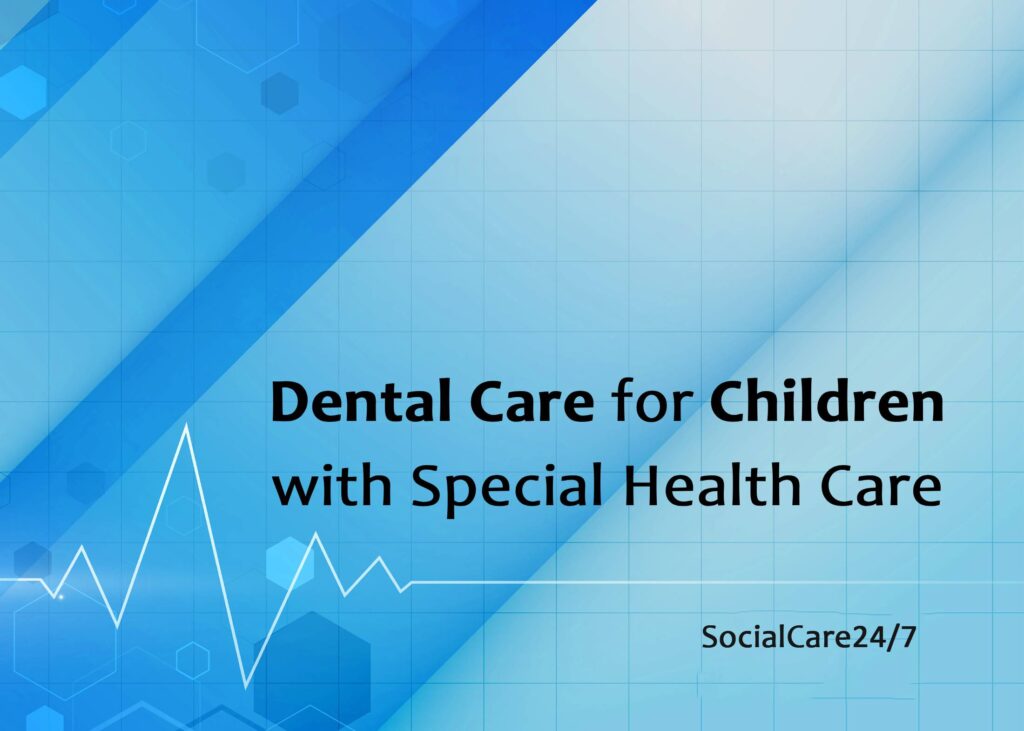Have you ever thought about how kids who need extra medical care get the dental care they need
Ensuring kids with special medical needs get good dental care is critical, but it can be challenging. When it comes to dental care for children with special health care needs, parents and workers must be patient, pay attention, and know what they’re doing.
We can help ensure every child’s smile stays bright, healthy, and long-lasting by learning about the specific problems and ways to solve them. This article discusses why dental care is essential for kids with special healthcare needs and gives caregivers and healthcare providers valuable tips.
Understand Oral and Specific Health Care
Special-needs youngsters with physical, developmental, behavioural, or emotional issues may struggle to maintain healthy teeth. For children with autism, cerebral palsy, or Down syndrome, dental care may be different.
These kids may require extra help with dental care or during excursions. Specialized treatment can improve gum and tooth health.
Why Early Dental Appointments Matter
Starting early with dental care is essential for special needs kids. Youngsters should visit the dentist by their first birthday, even before their first tooth appears. Beginning dental checkups early helps youngsters establish a routine and become comfortable.
Early visits can help special needs kids trust and relax around dentists. Parents and doctors can create a child-friendly plan.
Customizing Oral Hygiene Procedures
A child with specific health care needs may need to adjust their toothbrushing routine to suit their skills or sensory preferences. A child with problems moving their hands may need a power toothbrush or a toothbrush with a more oversized handle to brush their teeth.
Parents and other adults who care for impaired children may need mouth wipes or rinses to assist them in washing their teeth. To maintain a child’s teeth healthy, create a customized plan.
Diet and Dental Care
Kids with special needs should consider what they consume for mouth health. Children with autism or cerebral palsy may have problems eating, leading them to eat sweet or sticky foods that develop cavities.
Monitor their eating, ensure kids get adequate nutrients, and restrict sugary drinks and snacks. Pediatric dentists and nutritionists can help parents provide their children with healthy, personalized meals.
Overcoming Dental Fear
Special needs youngsters are more likely to be nervous about the dentist due to sensory difficulties or past trauma. This might make routine dental treatment for special needs kids difficult for the child and the doctor. Parents should inform the dental team of their child’s sensitivities and triggers.
You may let the youngster go to the office before their appointment, utilize visual aids, or undertake dental care at home to soothe them.
Selecting The Best Dentist
Children with health issues require the correct dentist for oral care. There needs to be more than just finding a decent general dentist. Find one with special training and experience in handling the unique challenges of caring for disabled or medically compromised children. Your child requires a pediatric dentist who specializes in specific needs.
Will know how to address needs. Special needs dentists understand how autism, down syndrome, cerebral palsy, and other physical or developmental issues can make tooth care difficult for children. With this information, they can adjust their approach to youngsters with physical, emotional, or mental problems.
The dentist must be skilled, compassionate, understanding, and able to adapt their treatment. Kids with specific healthcare requirements often have anxiousness or sensory challenges, so the dentist must be quiet and caring.
Long-term Checkups and Care
After creating a solid dental care plan for a special needs child, monthly checkups are essential. When a child visits the dentist every six months, the dentist can monitor their oral health, discover concerns early, and adjust their treatment plan. Kids at risk for cavities, gum disease, or other dental issues due to their health or medications must make these regular visits.
The dentist can clean, fluoridate, and check you during routine checkups. Kids who have trouble brushing or have dry mouth, which can create plaque, need cleanings more often. The dentist will also assess the child’s dental hygiene and provide home care tips during these appointments. Thus, even without checkups, the child’s dental health will be a concern. Special needs kids may need different treatment from the doctor regarding frequency and type.
Disabled children may require more frequent visits or additional treatments to prevent cavities and gum infections. Regular visits allow the dentist to tailor a preventive plan to the child’s risk factors.
Conclusion
The dentist is vital to the health of special needs children. Starting early, personalizing routines, watching what they eat, managing anxiety, and finding the proper dentist can help youngsters preserve healthy smiles. dental care for young kids is worth the extra work and time due to its many benefits.
Dental Care for children with special health care prevents future issues and promotes confidence and quality of life. Remember that regardless of health, every child deserves lifelong healthy smiles with the correct guidance and strategies.
Source links:
https://aloradentalclinic.com/choosing-right-pediatric-dentist-child/
https://clovedental.in/blog/kids-dentistry/things-to-choose-a-pediatric-dentist



